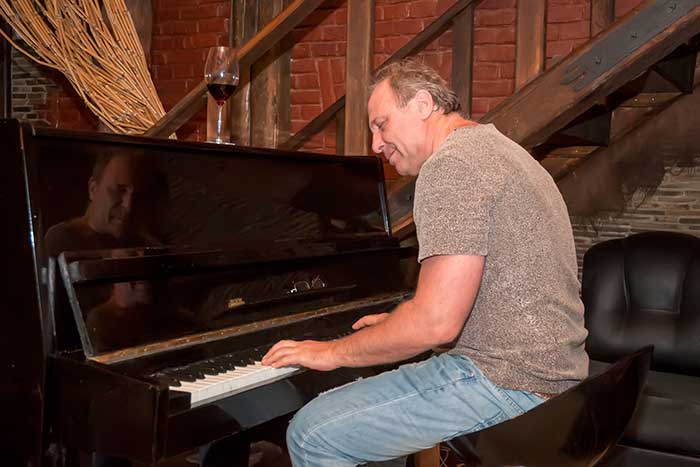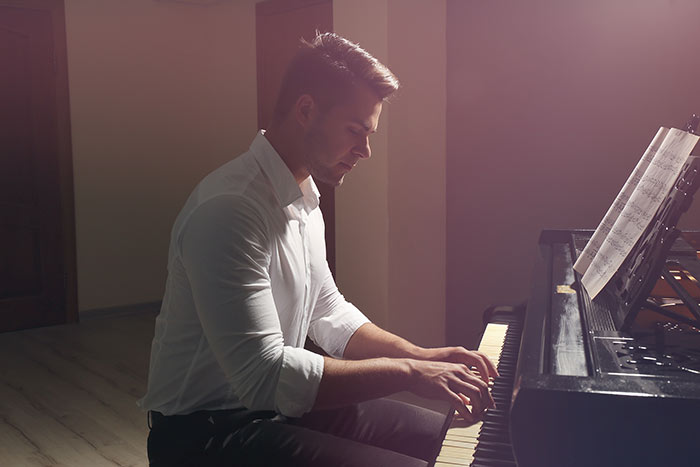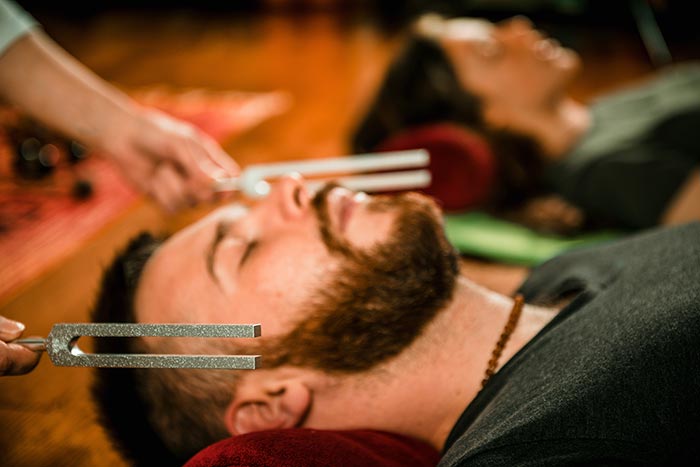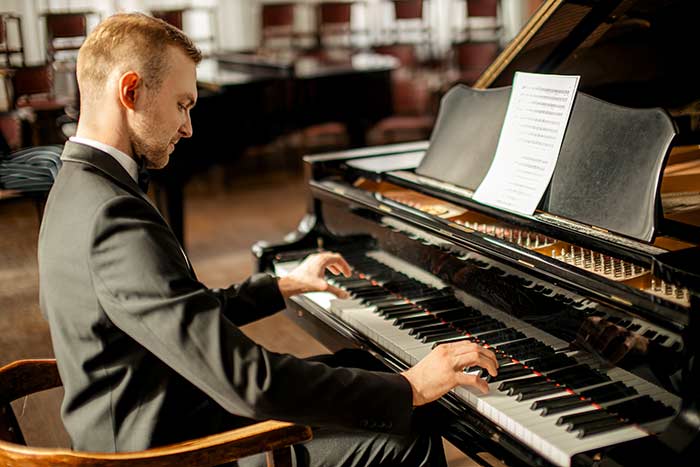Celine Gaurier-Joubert shares her wisdom and expertise to help you improve your piano playing as a serious amateur pianist in London!
Improving your skills #1 – What to do when you feel that you are unable to improve further after reaching a certain level of musicality
At The London Piano Institute, we have met hundreds of amateur pianists who felt in need of benefiting from the expert advice of a professional pianist as they could not find the way to improve on their own anymore. They felt as they were facing a wall.
Many adult amateur pianists are in this situation, and despite trying hard, they are unable to solve technical or musical issues on their own. It is absolutely normal. Asking for the support of a professional pianist is necessary if you wish to take your piano playing to the next level.
There is no shame at all in asking for help, but it is essential to seek advice from highly experienced pianists and piano instructors to ensure that their guidance will produce immediate and long-lasting results.
Improving your skills #2 – What to do when you are frustrated with your technical abilities
Depending on your specific situation, you are perhaps unhappy with your technical abilities and feel that your fingers are not flexible enough to perform the music that you have in mind. You might be listening to concert pianists who execute the same piece with an extraordinary dexterity while you are struggling to play a passage evenly.
Do not worry. It is extremely common among amateur pianists.
You must remember that concert pianists have started to play the piano at a very young age, have spent countless hours practising and have benefited from the exceptional piano education of a master pianist.
You should therefore not compare yourself with the most skilled professional pianists, but you can definitely improve your technical skills drastically thanks to the advice of a brilliant piano instructor.
Like everything else in life, there is no mystery. If your technical abilities are poor, it is merely because your technique has not been developed and worked on properly.
An excellent piano instructor will definitely be able to advise on the most rewarding piano exercises to practice daily, and he/she will be able to offer you the guidance needed to focus on the right exercises without wasting any time.
At The London Piano Institute, we have met several amateur pianists who think that playing scales daily would resolve all their technical issues.
Playing scales is very helpful to develop your knowledge of the keyboard and dexterity when playing consecutive notes, but it will not help you perform double notes, such as thirds, sixths or octaves or improve your ability to play trills neatly.
Each technical difficulty that could arise in a piece of music should be practised first via technical studies in order to be ready when it comes up in a piece of the repertoire.
There are so many technical difficulties that you might undoubtedly feel a bit lost. You might not know where to start and how to structure the practice of all these various difficulties.
Once again, an excellent and highly skilled piano instructor will easily be able to direct you and improve your overall technical abilities reasonably quickly.
It is especially important as, as funny as it can sound, most of the technical issues that can seem insurmountable to you can often be resolved by a simple wrist movement that is not done correctly!
Improving your skills #3 – What to do when you’re disappointed with your sight reading skills and you spend far too much time learning a new piece of music on aggregate
Throughout my teaching career, I have met several amateur pianists who were able to perform quite difficult pieces of the repertoire but were not satisfied with the amount of time it took them to learn a new piece of music.
Once again, sight-reading is a skill that must be developed and worked on.
All concert pianists read a new score instantly thanks to their incredible reading skills.
By studying with a professional pianist, you will surely resolve this issue as he/she will structure your piano playing and help you choose the right exercises to improve this problem while working on appropriate pieces of the repertoire.
Sight-reading must be practised daily alongside technical exercises as this skill is essential if you wish to truly enjoy your piano practice and not spend all your time decrypting the score!
Struggling and stumbling when starting a new piano piece is hugely frustrating and discouraging. It is the reason why you need some direction to resolve this issue once and for all!
Improving your skills #4 – Have you thought about the importance of interpretation and sound production?
Most of the amateur pianists I have met at The London Piano Institute were unsatisfied with their pure technical skills, but I cannot remember hearing them complain about their interpretation or sound production skills.
As if they were not aware of it at all. As if they did not consider it.
It is interesting as sound production and interpretation are everything in piano playing. A perfect dexterity is, of course, essential but it is only built to allow you to support the expression you wish to add to a composition.
It is for this reason that I insist on enhancing dexterity alongside sound production and interpretation.
Most of the advanced amateur pianists who have joined my class in London came first with a reasonably good technique that allowed them to perform quite difficult pieces, but I have rarely heard someone who understood how to interpret a piece of music.
Most of the time, adults listen to the interpretation of a concert pianist and try to copy it without putting any expression of their own into the piece. On other occasions, they are delighted to play all the notes correctly without realising that the most essential element is missing: music.
Adding interpretation, breathing spaces, character, dynamics and colours into a piece of music is fascinating, and it is perhaps the skill that amateur pianists lack the most. Sometimes because they did not benefit from a good piano instruction before joining The London Piano Institute or because they were simply not aware of it in the case that they are self-taught.
As I said, it is the part of the work that is the most interesting while learning a new composition and it is always a great pleasure for us to help amateur pianists enhance it drastically!
I enjoy helping them feeling the music immensely, and I am always astonished by the exceptional results!
My most advanced pupils usually prepare a piece in the sense that they have learnt all the notes correctly before performing it for me. We, therefore, have a foundation on which we can add all the musical elements and turn a raw performance into a jewel!
I have myself discovered what interpretation and sound production truly meant thanks to my master piano instructor Edson Elias when I was an adolescent. I knew that something was not quite right in my piano playing, but I could not put my finger on it.
After only one lesson with him, my understanding and feeling of music literally transformed. It was due to him singing alongside my playing instead of giving me instruction. I now apply this technique with all my piano pupils. I am always incredibly impressed to hear a completely different interpretation in a matter of a few minutes only!
Improving your skills #5 – You definitely need to seek advice from an expert to solve unique and specific issues in your piano playing
All pianists are different as all individuals are unique.
We all have various issues when it comes to piano playing and I have never met two pupils who had the same concerns or problems.
Each issue is extremely specific due to the nature of the individuality of a pianist.
Our body and mind are so unique that the answers to your questions about piano playing cannot be found in a book.
As I said earlier, sometimes an issue that can affect your entire playing is due to a detail that can either be a wrong fingering or a stiff wrist. It is possible to self medicate yourself thanks to the analysis but getting the feedback of a professional pianist is often necessary to resolve our problems.
In my early 20s, I was already an extremely advanced professional pianist but I still needed and enjoyed the observation of a master concert pianist.
I remember two examples that can illustrate it well:
- I was studying “Dante” by Franz Liszt for a few months already but I could never produce the sound I had in mind for the first few bars of the piece. I played it for my master instructor in Switzerland who immediately told me: “Your wrist is too relaxed”. I tensed it up and the sound suddenly became exactly what I was looking for!
- I was struggling with Chopin’s 1st study. My master instructor told me: “It is simply because your stool is too low”. Isn’t it amazing!
Even as a professional pianist myself, I could not figure out these little details. It is why it is essential to get feedback on a regular basis!
Good criticism is also important.
One of my piano students always thinks that she is not playing well enough and start all her lessons by telling me that it is a disaster. Well, I never think that it is the case. On the contrary, I think that she is doing extremely well, and I am often impressed by her progress.
It is happening as I obviously have much more experience than her in piano playing and I can hear small improvements that are part of the overall picture. A part of the puzzle we are building.
Once again, performing for an expert pianist could truly help you discover how to improve your piano playing but also realise that a large part of it is actually much better than you imagine!
Improving your skills #6 – Benefiting from structure and direction
Another reason why it is a good idea to work with a piano instructor is the sense of structure and direction that you will benefit from.
Being alone at home in front of your piano could be lonely, you might lack motivation or not know what to do next.
You might also be in the situation of playing pieces to a certain level and give them up without satisfaction when you do not know how to improve them further.
Thanks to the instruction of an excellent piano teacher, you can then benefit from a structure, and practise from a week to another with a goal in mind.
At the end of my piano studies in Switzerland, we only had lessons once a month as we had to prepare an entirely new repertoire each time. The lessons were extremely long (about 4 hours each). I did not enjoy this arrangement as I lacked feedback along the learning process and I felt quite lost.
By attending weekly lessons and benefiting from good guidance, you can then improve your skills progressively and being assured that you are heading in the right direction.
Even the best concert pianists in the world sometimes play for their colleagues to get feedback before performing new pieces in a concert hall. You see, there is no shame in sharing your piano playing with an expert!
Improving your skills #7 – Know what are the right compositions to play and discover other pieces of the repertoire
As I said earlier, we all have a different body and mind. This individuality is undoubtedly important to respect when choosing a new piano piece and an experienced pianist would surely be able to advise you on this matter.
You could, for example, wish to play Rachmaninov but if you have small hands and a slim body, it will probably turn out to be extremely difficult.
Or you could enjoy Mozart sonatas extremely much. Playing them with very large hands will certainly be harder than for somebody who has smaller hands.
Knowing which pieces suit us best comes with experience and relying on your instructor will undoubtedly be extremely helpful if you do not want to head in the wrong direction.
On the other hand, it is a fantastic exercise to study a piece that would initially not suit you well to develop other skills, but it is advised to discuss with your piano instructor prior.
Most of the piano pupils I have met so far tend to stick to a specific style (baroque, classical, romantic or modern) in their choice of pieces but also in the music they listen to at home or the concert.
A student would, for example, have a broad knowledge of the classical period but would never have heard compositions written by Prokofiev, Shostakovich or Ravel.
Concert pianists usually specialise in a specific style after studying all of them immensely. They would know which composers suit them best, but they can only make this decision after working on all of them.
I sometimes offer music discovery masterclasses for my piano pupils to discover pieces that are not performed so often. On one occasion, I played “Iberia” by Albeniz. My Japanese student loved it so much that she decided to start learning it. I was so pleased when I heard her version which was formidable!
Improving your skills #8 – As an adult amateur pianist, improve your piano skills drastically at The London Piano Institute
I first thought about The London Piano Institute in 2005 when I was mostly teaching children privately. As my parents are both amateur musicians, I thought that a countless amount of adults in London might also want to learn how to play the piano or develop their current skills with instructors who would specialise in adult piano education.
Adult amateur pianists were left in the dark, as piano academies mostly care for children and there is rarely a section for adults.
I have therefore created a unique haven of music entirely dedicated to adult amateur pianists as I wanted to offer them the rare privilege to express themselves in an environment that would be extremely suitable!
It is a real success and I am extremely pleased to see so many adult amateur pianists develop their skills and enjoy their passion for the piano at The London Piano Institute!







